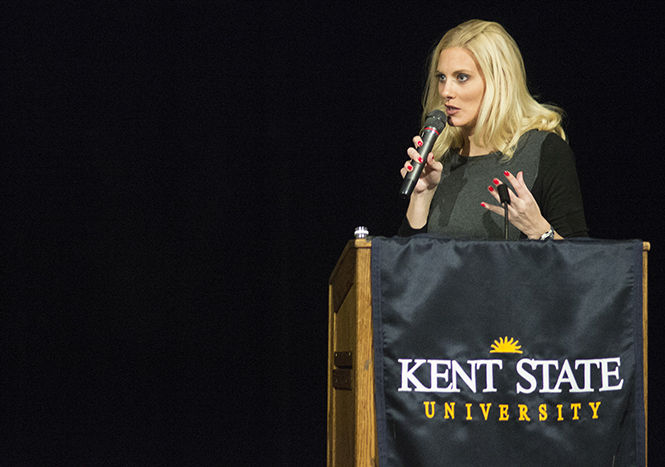Former female college football player discusses gender inequality in sports
Katie Hnida, the first woman to ever score in an NCAA Division 1 football game, speaks in the Student Center Ballroom on Wednesday, Oct. 29, 2014 about her experiences with sexual harassment and rape. Hnida played for The University of Colorado Boulder after a successful highschool career as a kicker, but after constant sexual harrassment left the team and ended up at The University of New Mexico, where she made NCAA history.
Katie Hnida, the first woman to play Division I college football, told students about her struggle with harassment on and off of the field in the ballroom Wednesday night.
“I grew up a huge football fan, but I thought due to my size and my gender I would always end up watching football from the sidelines,” Hnida said. “Anyone who’s passionate about anything understands that when you go out and do something, it’s one of those things where you can lose space and time because you love it so much. That’s how it was for me playing ball.”
When Hnida decided to join her high school football team, she was asked if she was lost and looking for the girls’ lacrosse team because “girls can’t play football.” She recounted her first year on the team as being a new experience for everyone. Something as simple as finding a place for a female football player to change had not been considered in 1995. Teammates would endlessly joke about whether or not they could pat her on the butt like the other players. All jokes aside, by the time she was a senior, Hnida was leading the state in points made. She said she never thought about not being able to play football in college because it was what she loved to do.
Hnida became a kicker for University of Colorado, which seemed like “a dream come true” at first, until the harassment from her fellow players escalated. She said the quarterback would throw footballs at her head when she was warming up. The abuse turned sexual when she went over to a teammate’s house to watch a basketball game, only to end up being raped on his futon.
“I was raised thinking that if you were raped, it would be in a dark alleyway with some guy you don’t know when you were walking by yourself somewhere you weren’t supposed to be,” Hnida said. “I didn’t think at all that it could be someone that I knew, let alone someone that I trusted.”
Hnida told the audience 75 percent of rapes are committed by someone that the victim knows. She discussed the misconceptions that society holds on rape, and the tendency society has to blame victims. After she was raped, she asked herself if she had not been wearing those shorts, would it have happened?
When three women who had been raped by Colorado football players came forward in 2004, Hnida decided that she couldn’t be silent anymore.
“The university attacked me for coming forward. I was a virgin when I was attacked, but I discovered that my rapist would probably never get jail time,” Hnida said. “We’ve had a lot of things about football and violence in the media. We are just starting to tackle them now and talk about them.”
She left her spellbound audience with a shout-out to another woman who plays Division I college football, Kent State’s own kicker April Goss. Hnida also encouraged students to keep learning about rape culture to end sexual violence forever.
“I think it’s a big deal that we have a girl here on our team,” said Abri Dubler, a sophomore exercise science major who attended Hnida’s speech. “It opens it up to people to see that girls should be able to do what they want to do. They shouldn’t feel uncomfortable.”
Contact Jamie Brian at [email protected].



